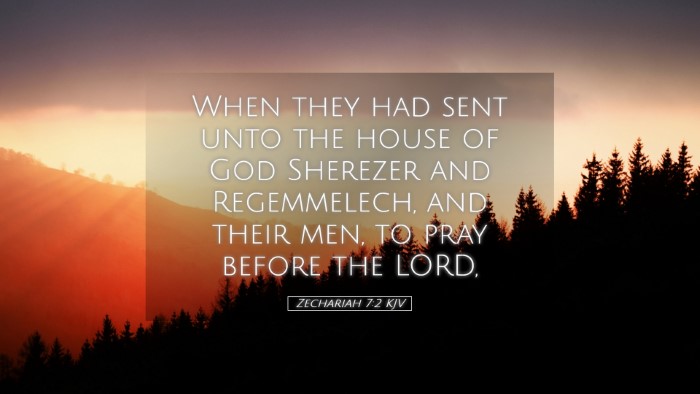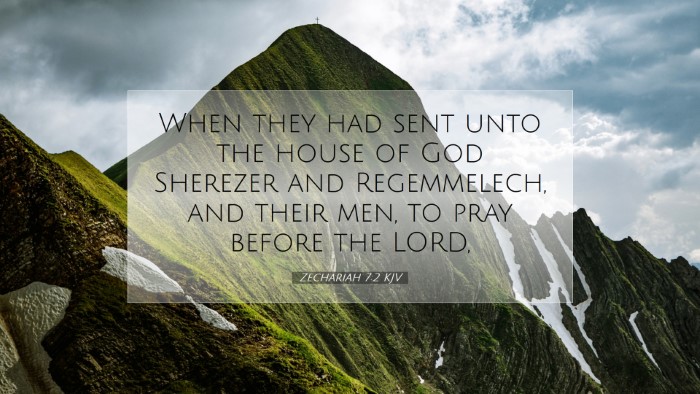Old Testament
Genesis Exodus Leviticus Numbers Deuteronomy Joshua Judges Ruth 1 Samuel 2 Samuel 1 Kings 2 Kings 1 Chronicles 2 Chronicles Ezra Nehemiah Esther Job Psalms Proverbs Ecclesiastes Song of Solomon Isaiah Jeremiah Lamentations Ezekiel Daniel Hosea Joel Amos Obadiah Jonah Micah Nahum Habakkuk Zephaniah Haggai Zechariah MalachiZechariah 7:2
Zechariah 7:2 KJV
When they had sent unto the house of God Sherezer and Regemmelech, and their men, to pray before the LORD,
Zechariah 7:2 Bible Commentary
Commentary on Zechariah 7:2
Verse: "Now the people of Bethel had sent Sharezer and Regemmelech, and their men, to pray before the Lord,
Introduction
The verse from Zechariah 7:2 marks a significant moment in the life of the returning exiles. It narrates an event where certain individuals from Bethel sought clarification and guidance from the Lord. This commentary synthesizes insights from esteemed public domain commentaries, providing a comprehensive understanding that would resonate with pastors, theologians, and biblical scholars.
Contextual Background
Zechariah, serving as a prophet during the post-exilic period, was called to encourage the people of Judah who had returned from Babylonian captivity. This book addresses the concerns of the Jewish community, reaffirming their covenant with God and His promises for restoration. The specific mention of Bethel, a city with a rich history tied to Jacob and later to idol worship, indicates the duality of the people's spiritual condition.
Significance of Bethel
Bethel, which means "House of God," was a center of worship, yet, throughout its history, it had also been a place of idolatrous practices. The mention of the people from Bethel in Zechariah 7:2 highlights their desire to seek God amid a complex spiritual landscape. This reflects a longing for reaffirmation in their faith.
Analysis of the Characters: Sharezer and Regemmelech
Sharezer and Regemmelech are noteworthy figures in this passage. Their names can be viewed as representative of the broader community's quest for divine guidance.
Sharezer
Meaning: Sharezer means "defender of the king." This name can be significant, symbolizing the protective nature of faith and the responsibility of leadership within the community. Sharezer's role may suggest an advocate's approach to seeking God's will for the people.
Regemmelech
Meaning: Regemmelech means "the king's friend." This name conveys a sense of intimacy and relationship with authority. His presence indicates an understanding that approaching God in prayer requires both humility and recognition of His sovereignty.
The Purpose of Their Mission
The delegation from Bethel had a clear purpose: to pray before the Lord. This was not merely a formal visit; it was a spiritual pursuit. As the people of Bethel sent these men, they symbolized a yearning for corporate engagement with God.
Prayer as a Theme
Prayer in the Old Testament often served as a means of seeking God's will, guidance, and forgiveness. The act of praying indicates a sincere desire for divine intervention and the restoration of the covenant relationship that had faced numerous challenges.
Corporate Prayer
The implication of a collective effort to approach God underscores the communal aspect of faith. The returning exiles recognized that individual piety must be expressed in a communal form, particularly when faced with uncertainty about their covenant status.
Theological Insights
Zechariah 7:2 invites fundamental theological reflections that resonate with contemporary readers.
-
The Nature of God:
This verse reaffirms that God is accessible to His people. The initiative taken by Sharezer and Regemmelech illustrates a belief that God listens and responds to His people, encouraging a robust prayer life.
-
The Importance of Seeking God:
The act of seeking God through prayer is vital. It emphasizes humility, the acknowledgment of personal and national sin, and a desire for guidance in righteous living.
-
Restoration and Covenant Relationship:
The context of post-exile emphasizes restoration. The returning exiles were physically back in their land, yet spiritually they were on a journey to rebuild their relationship with God fully.
Lessons for Pastors and Theologians
This passage also serves as a practical text for pastors and theologians. It invites reflection on several key aspects:
-
Promoting Corporate Worship:
The efforts of the Bethel representatives should inspire church leaders to advocate for corporate worship experiences that foster a deeper understanding of seeking God together.
-
Encouraging Prayer Initiatives:
The importance of prayer as a collective endeavor signals the necessity for structured prayer meetings and engagement in spiritual disciplines that guide congregations.
-
Addressing Spiritual Complexity:
Recognizing the duality of worship practices in congregations can help pastors address challenges and guide their communities back to a focus on God.
Conclusion
Zechariah 7:2 provides profound insights into the practices of prayer and the importance of divine guidance in the life of God's people. Through the lens of Sharezer and Regemmelech's mission, we glean valuable lessons that emphasize the need for communal seeking of God in a landscape marked by both devotion and idolatry. The intersection of historical context, theological significance, and practical applications forms a rich tapestry for reflection and action in the faith community today.


